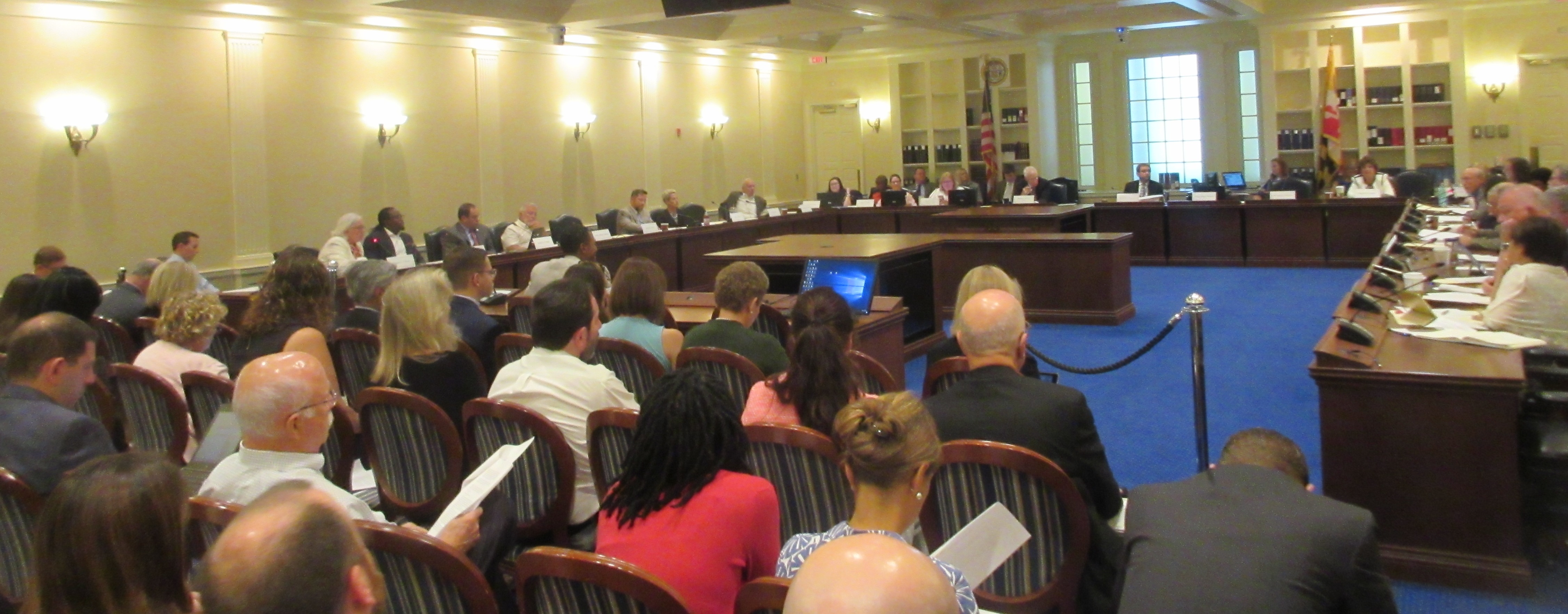By Len Lazarick
How much it will cost to expand pre-Kindergarten to most 3- and 4-year-olds in Maryland or to substantially raise teacher salaries have become heated arguments in the race for governor.
But the state Commission on Innovation and Excellence in Education that is supposed to be determining the price tags for these and other big public school changes appears to be months away from decisions on revising funding formulas that was the basic charge of the commission.
Instead, under the guidance of Commission Chairman Brit Kirwan, former chancellor of the university system, they have focused on giving Maryland a “world-class education system” comparable to high-performing schools around the globe.
On Thursday, three of the four major work groups fleshing out the details of recommendations on early childhood education, pathways to college and career readiness, and producing high quality teachers, reported to the commission.
The moderators of the work groups admitted that their plans were radical departures from the current public school system, and that they did not know how much these radical plans might cost.
Early childhood education
Montgomery County Councilmember Craig Rice, who chaired the early childhood work group, told county officials two weeks ago, “it’s going to cost a lot.”
The proposal in the early childhood workgroup report Thursday would expand “high–quality” pre-K to four-year-olds based on a sliding scale and to all three-year-olds from low-income families. Unlike current kindergarten, the new program would be voluntary and families with incomes over $75,000 would absorb some of the costs. Current private and religious preschools would be included.
The report said it will require “significant investment from the local jurisdictions and community–based providers.”
“Research shows that investing in the early childhood learning and development of disadvantaged children yields a high return to society, offsetting taxpayer costs for poor health, dropout rates, poverty, and crime,” the report said.
College and career readiness pathways
The report on college and career readiness includes major changes in the requirements for a diploma and revamping of career and technical education. “It does not preserve the current system,” said workgroup moderator Chester Finn, a longtime education expert on the state school board.
“This is not your mom’s low-tech” school, said Merritt Properties president Scott Dorsey, the only business executive on the commission. “This is a fundamental change at the way we look at education.”
“It will really set Maryland apart,” Kirwan said. But Finn said, “The costing out has not been done.”
Far-reaching changes for teachers
Perhaps the most far-reaching, radical and complicated proposal came from the report of the work-group on high quality teachers and leaders, chaired by Sen. Paul Pinsky, D-Prince George’s, who is set to become chair of the Senate education committee in January. Pinsky admitted, “We have not costed it out.”
The report proposes teachers be recruited from the best and brightest high school students, as they are in other high-performing countries; they would have their college tuition subsidized, and their training would include a full year of student teaching;
The teachers would then go into a career ladder where promotion and pay raises would be based on performance in the classroom and collaboration with other teachers, and not be automatic based on years of service or degrees completed. “This path is radically different” and “a paradigm shift,” Pinsky, a longtime friend of teachers unions, conceded.
Teachers would also spend less time in the classroom — 60% rather the current 80% — with the other 20% “used to work in teams with other teachers to improve instruction, work with and tutor students who are falling behind, manage a caseload of the most challenging students and those from concentrated poverty, and participate in professional learning.”
Teachers would have to meet other higher standards for professional certification, but would be rewarded with higher pay comparable to other professions such as accounting and engineering.
The report also recommended an immediate 10% pay hike for all teachers to bring them to the pay levels of Massachusetts and New Jersey, which are considered models.
“This level of change is very radical,” Kirwan commented.
The proposed changes are complicated because they involve so many stakeholders, including the state school board, the local boards of educations, the local teachers unions which contract with each of them, and the colleges and universities that provide teacher training.
Kirwan’s successor, current University System Chancellor Robert Caret who sits on the commission, commented, “It’s a great idea, but it’s going to be very, very expensive.”
Appropriations Committee Chair Maggie McIntosh, D-Baltimore, a commission member, said, “This is an area we’ll be debating for quite a while.”
Hogan pressured on Kirwan
Despite the radical changes, the absence of final recommendations and the lack of any estimate on their cost, at an Aug. 18 press conference, Pinsky pressured Gov. Larry Hogan to commit to funding all the recommendations of the Kirwan commission.
In an interview, Hogan called the request “silly. I mean I can’t believe how desperate they are or they seem. Will the governor agree to raising taxes to pay for some unfinished report that we don’t know what they’re gonna ask for what or what it’s going to do? How could you possibly answer that?”
“Look we supported the Kirwan commission recommendations that came out in January,” fairly minor changes with small price tags.
“We’ve record-funded schools over the legislative formulas — 25 billion dollars. We committed to the $4.4 billion dedicated from casino revenue with the lockbox that we support and we’re going to look at the Kirwan commission recommendations if they make any sense. And they’re spending money in the right place and certainly will look at supporting them but we can’t commit to something that’s nothing but ether.”
The commission has been working for almost two years now, and has already extended its deadline twice for final recommendations.





What good is the Kirwan Commission if they can’t offer guidance regarding education ?
We taxpayers should demand our money back…